|
|
|
Sort Order |
|
|
|
Items / Page
|
|
|
|
|
|
|
| Srl | Item |
| 1 |
ID:
117709


|
|
|
|
|
| Publication |
2012.
|
| Summary/Abstract |
Venezuelan President Hugo Chávez fended off a spirited challenge by Governor Henrique Capriles this fall. But continuing questions about Chavez's health and the country's dismal governance suggest that change may be coming soon. Looking ahead, the opposition will need to address concerns by the very poor that social spending will dry up if Chávez is no longer in office. Meanwhile, political differences and power struggles, and a sense of demoralization, risk undermining Capriles' diverse coalition. The regional scenario would look very different without Chávez. External players should restrain from meddling during this period of uncertainty. Instead, support should focus on trying to ensure that Venezuelans continue to rely on the ballot box in determining the course of a country facing so many daunting problems.
|
|
|
|
|
|
|
|
|
|
|
|
|
|
|
|
| 2 |
ID:
117711
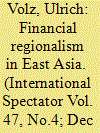

|
|
|
|
|
| Publication |
2012.
|
| Summary/Abstract |
This article provides an overview of the current state of financial regionalism in East Asia and discusses why and how the East Asian countries should go forward in terms of financial and monetary regionalism. It highlights intra-regional exchange rate stability as an important regional public good and makes the case for greater exchange rate cooperation. To this end, East Asian countries should gradually reduce their exposure to the US dollar and move towards currency basket regimes which would sustain relative intra-regional exchange rate stability while allowing for sufficient flexibility to accommodate idiosyncratic shocks. Against the backdrop of the global and European financial crisis, the article also urges a reconsideration of the costs and benefits of international - and regional - financial integration and calls for a further strengthening of East Asia's regional financial architecture.
|
|
|
|
|
|
|
|
|
|
|
|
|
|
|
|
| 3 |
ID:
117703


|
|
|
|
|
| Publication |
2012.
|
| Summary/Abstract |
The failure of the Los Cabos summit to satisfactorily address the European sovereign debt crisis and ominous world economic outlook, let alone agree on concrete measures to improve the oversight and functioning of the global economy, appears to confirm the diminishing effectiveness and relevance of the G20 as an organ of international governance since its inception in December 2008. While few accomplishments were achieved in the area of global governance during the Mexican presidency, acute collective action problems, made worse by the present economic crisis, paralysed the G20 in the lead-up to and during the Los Cabos summit. These collective action problems and the ensuing failure of global governance are attributable to the absence of leadership evident at both the global and European levels, which in turn testifies to the excessive dispersion of state economic and political power within the international system.
|
|
|
|
|
|
|
|
|
|
|
|
|
|
|
|
| 4 |
ID:
117712
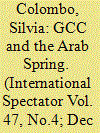

|
|
|
|
|
| Publication |
2012.
|
| Summary/Abstract |
Since 2011, the Gulf Cooperation Council (GCC) countries have been confronted with increasing challenges stemming from the Arab uprisings. Internally, they have had to face popular mobilisation and discontent, triggering a mixed reaction, including economic handouts, patronage, limited political and economic reforms as well as military intervention and repression. Externally, they have actively intervened in support of the protest movements in Syria and Libya and enthusiastically facilitated President Saleh's departure from Yemen. At first sight these responses may seem schizophrenic. Upon closer inspection, however, managing instability by shoring up friendly regimes on the inside and expanding the GCC's influence outside represent two sides of the same coin.
|
|
|
|
|
|
|
|
|
|
|
|
|
|
|
|
| 5 |
ID:
117706


|
|
|
|
|
| Publication |
2012.
|
| Summary/Abstract |
Despite two bailout agreements of unprecedented size and the implementation of a harsh austerity programme, no solution to the Greek crisis is in sight. As a result, Greece continues to be a hotspot, sending sporadic tremors to a fragile eurozone. The outcome so far leaves no doubts about the grave mishandling of the crisis. The most important cause of this failure is the lack of political leadership at both the national and European levels. Accordingly, a solution to the Greek crisis will remain elusive unless Greek and Europeans politicians overcome the constraints of national political calculations and exercise leadership commensurate to the challenge of rescuing Greece and indeed the eurozone itself.
|
|
|
|
|
|
|
|
|
|
|
|
|
|
|
|
| 6 |
ID:
117713


|
|
|
|
|
| Publication |
2012.
|
| Summary/Abstract |
The past year has seen a steady rise in tensions with regard to Iran's nuclear programme. Iran's economy is being crippled by far-ranging sanctions and the threat of an Israeli attack on Iranian nuclear facilities looms large on the horizon. Yet the country's nuclear programme marches on, stoking fears that Iran may indeed be seeking to cross the nuclear weapons threshold. In this context, it is timely to consider how key regional players would respond to a nuclear-armed Iran. Many argue that an Iranian bomb would prompt a proliferation cascade in the Middle East. However, a closer examination of the drivers for key regional players shows that this is not necessarily the case. There is a range of non-proliferation tools that could be applied by the West and others to offset this risk.
|
|
|
|
|
|
|
|
|
|
|
|
|
|
|
|
| 7 |
ID:
117707


|
|
|
|
|
| Publication |
2012.
|
| Summary/Abstract |
Much recent international press coverage of Spain's difficulties portrays a country rapidly approaching political, economic and social meltdown. Its economy is contracting, its unemployment rate is at unprecedented levels and its sovereign risk premium hovers at apparently unsustainable levels. Spain will undoubtedly require external financial help from its European partners, as well as more time and flexibility to achieve its fiscal targets. But it also has a number of strengths that are too often overlooked. Spending cuts and structural reforms are proceeding at a lively pace, unit labour costs are falling significantly, and exports and productivity are on the rise. In short, there is light at the end of the tunnel.
|
|
|
|
|
|
|
|
|
|
|
|
|
|
|
|
| 8 |
ID:
117704


|
|
|
|
|
| Publication |
2012.
|
| Summary/Abstract |
The current European crisis has shed light on several weaknesses and the institutional incompleteness characterizing the euro area. The manifestation of Europe's fragility was preceded by a large build-up of debt in the private sector, associated with national current account divergences and the deterioration of competitiveness particularly of the euro periphery countries. With the economic situation deteriorating, private sector debt became less credible, contaminating banks' balance sheets and placing a heavy burden on governments. A sovereign-bank vicious circle emerged: on the one hand, with banking risk translating into higher sovereign risk because of the governments' guarantor role and, on the other hand, with the deterioration of government's creditworthiness affecting the banking systems through banks' sovereign bond holdings. In principle, this negative feedback can be stopped by breaking one of the channels of transmission. A banking union at the European level is proposed as one solution.
|
|
|
|
|
|
|
|
|
|
|
|
|
|
|
|
| 9 |
ID:
117708


|
|
|
|
|
| Publication |
2012.
|
| Summary/Abstract |
The austerity program negotiated with the Troika (IMF-ECB-EC) and adopted by Portugal in 2011 is having a devastating impact on the Portuguese economy. Although the Portuguese government is clearly fulfilling the measures agreed with the Troika, the final outcome of the adjustment program is not entirely in its hands, but rather awaiting further EU decisions involving measures to stimulate economic growth, mutualisation of public debt and additional steps towards a federal Europe. As time goes by, the negative repercussions - in particular social and political instability, as well as the erosion of the Portuguese democratic regime - are inevitable if there is no light at the end of the tunnel.
|
|
|
|
|
|
|
|
|
|
|
|
|
|
|
|
| 10 |
ID:
117714
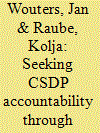

|
|
|
|
|
| Publication |
2012.
|
| Summary/Abstract |
The EU's Common Security and Defence Policy (CSDP) requires parliamentary accountability. At present, as CSDP-related decisions are increasingly taken in the framework of the UN or the EU, neither the European Parliament (EP) nor national parliaments are able to hold decision-makers accountable. Interparliamentary cooperation can provide added value in bringing about parliamentary scrutiny of CSDP. Nevertheless, despite an official agreement, the EP and national parliaments have different views on what such interparliamentary cooperation entails. There are five conditions - cooperation and complementarity among parliaments, conferential dialogues, coordinated agendas, and comprehensive and comparative scrutiny - that have to be fulfilled to create added value for interparliamentary cooperation on CSDP matters.
|
|
|
|
|
|
|
|
|
|
|
|
|
|
|
|
| 11 |
ID:
117705
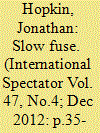

|
|
|
|
|
| Publication |
2012.
|
| Summary/Abstract |
Italy is firmly in the grip of an austerity programme mandated by the European Union institutions, and executed by an unelected technocrat. This state of affairs is at once the result of the acute and unexpected crisis of the financial and economic integration of the eurozone, and an expression of the failures of the Italian political class. Although the euro crisis has been mishandled by European elites, Italy's long-term economic decline, and the inability of Italian party politicians to generate a sustainable coalition to address Italy's economic problems, hinders an exit from the crisis.
|
|
|
|
|
|
|
|
|
|
|
|
|
|
|
|
| 12 |
ID:
117710
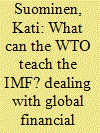

|
|
|
|
|
| Publication |
2012.
|
| Summary/Abstract |
Despite rising back to prominence during the global economic turmoil, the International Monetary Fund remains under severe pressure over its lack of legitimacy and effectiveness. It is surrounded by increasingly vibrant and potentially competing systems of regional financial arrangements. But while it is feared that regional arrangements can undermine the global financial order, they can also help buttress the multilateral institutions that are struggling to manage an increasingly complex global economy. The purpose of this article is to draw on trade, exploring the decades-long efforts to ensure compatibilities between regional trade agreements and the multilateral trading system, to offer lessons to financial policymakers.
|
|
|
|
|
|
|
|
|
|
|
|
|
|
|
|
|
|
|
|
|